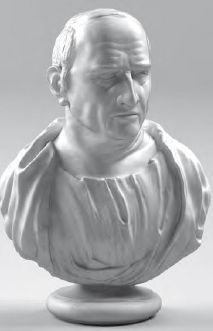Ancient PhilosophyHellenistic and Roman Philosophy |
What happened in Athens after both Plato and Aristotle were gone? |
Athens remained the center of philosophy until the Romans sacked it in 87 B.C.E. Much of our knowledge of Hellenistic philosophical activity comes from the first century B.C.E. Roman writers Lucretius (99–55 B.C.E.) and Cicero (106–43 B.C.E.), and secondary medieval sources. Plato’s Academy became the New Academy, which was devoted to critical work on the thought of other schools. This was the beginning of the skeptics. Aristotle’s Lyceum, or the Peripatos, was first led by Theophrastus in 322 B.C.E., but after 287 B.C.E., it fell into decline until the middle of the first century B.C.E.

Roman statesman and writer Cicero was influenced by the philosophers Panaetius and Posidonius (iStock).
